It was May 1901, and Joseph Aner was just five years old. As he boarded the train that would take him away from the New York Foundling Home, he was scared. He had ridden a similar train before to Nebraska, or was it Iowa? There he joined a nice family, but when his new Mom became ill, his Dad had a farm to tend to, with no time for Joseph. So, Joseph rode the train back to New York, to his first home, The New York Foundling Asylum.
This time, Joseph was going to Missouri. He knew he wasn’t going there to reunite with his “real Papa and Mama”—that’s what the caretakers told all the children. Even though he was only five, Joseph was an Orphan Train veteran.
There were 52 children on this Missouri Pacific line. In St. Louis, 15 of them met their new families. Another 36 rode deeper into Missouri, most of them to Osage City.
It there that Joseph met his new parents. Unfortunately, the first placement did not work out, and a local priest arranged for Joseph to join the family of Fred and Catherine Markway, of rural Cole County.
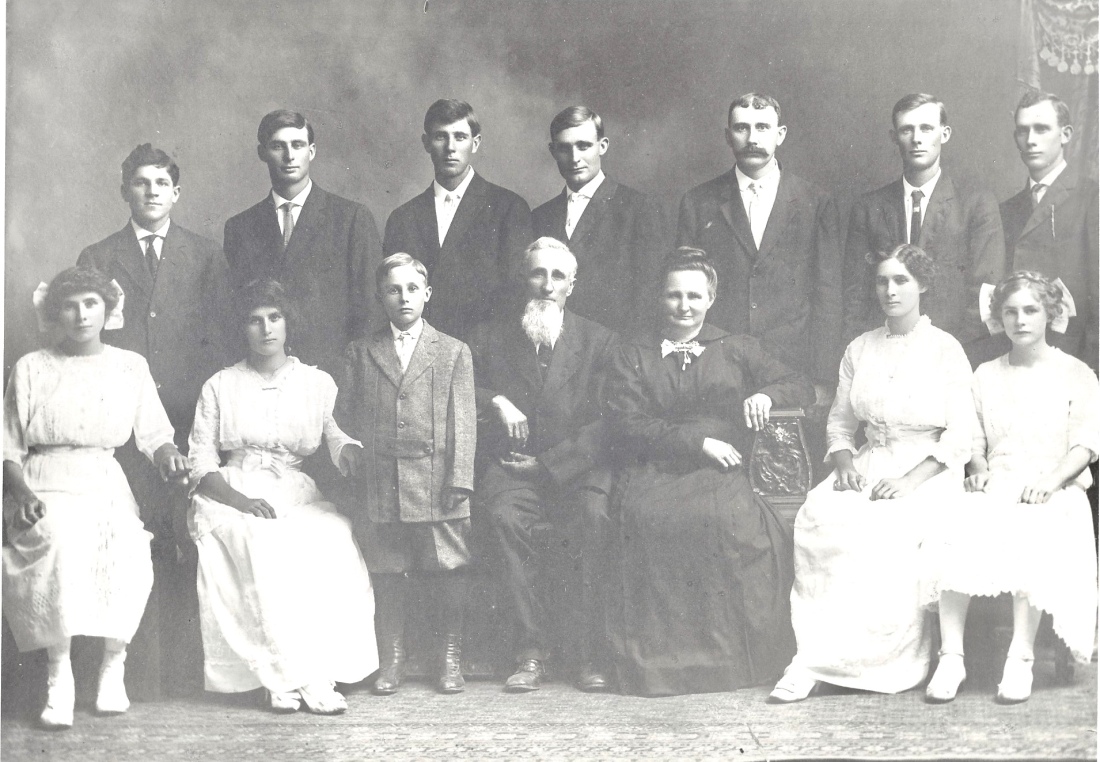
As long as I can remember, I knew my grandfather came from the New York Foundling Home, to Missouri, on an orphan train. As a child, I didn’t think a lot about it. I never thought about the empty space in his heart, of not knowing how he came into this world, of not knowing the beginning of his own story.
All I knew as a child was that Grandpa was the best. He made me feel loved and special. My very first memory was when I was three years old and my family moved from St. Louis to Jefferson City, MO. Jefferson City was where Grandpa lived and my Dad had grown up. My parents bought a two-bedroom home, for $6,000, for our family of seven. The house sheltered eight, though, when Grandpa moved in. Grandpa was fun, and funny, and he made me feel loved.
Grandpa died suddenly when I was 11. His belongings got divided up among my Dad and Dad’s two sisters. Dad got the name tag Grandpa had worn on the back of his jacket while riding the train in 1901. I had not seen that before, and seeing that piece of fabric, with his original name, Joseph Aner, written so elegantly in cursive,made his beginnings real to me. I wanted to know more. Who was Grandpa?
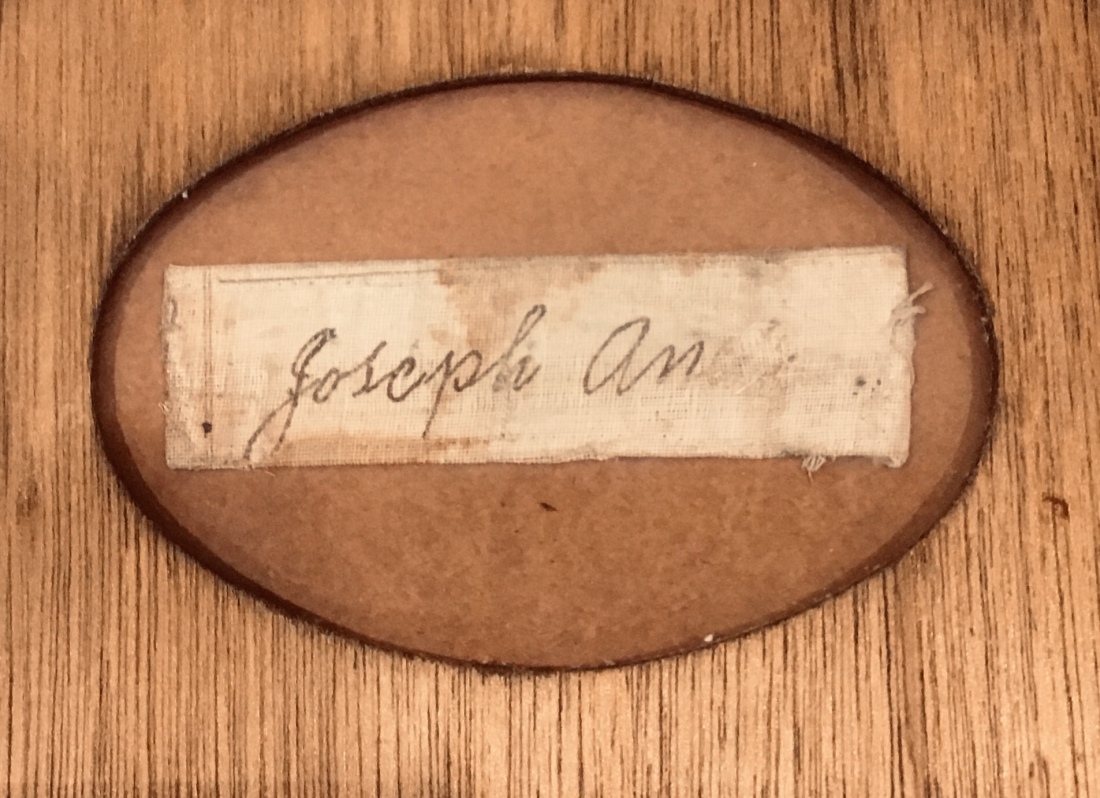
As I grew up, I remained curious about his origins, but I had no way of exploring them. In the 1990s, when I first logged onto the internet, the very first search I did was looking for the surname “Aner.” I found a few people in Philadelphia. Was there a connection to Grandpa?
Three years ago, I felt an overwhelming need to know more. I took an AncestryDNA test.
Before getting my DNA results back, I found his birth certificate online. It was difficult to find because it was filed under “Auer,” not “Aner.” As you can see, the handwriting was not clear.
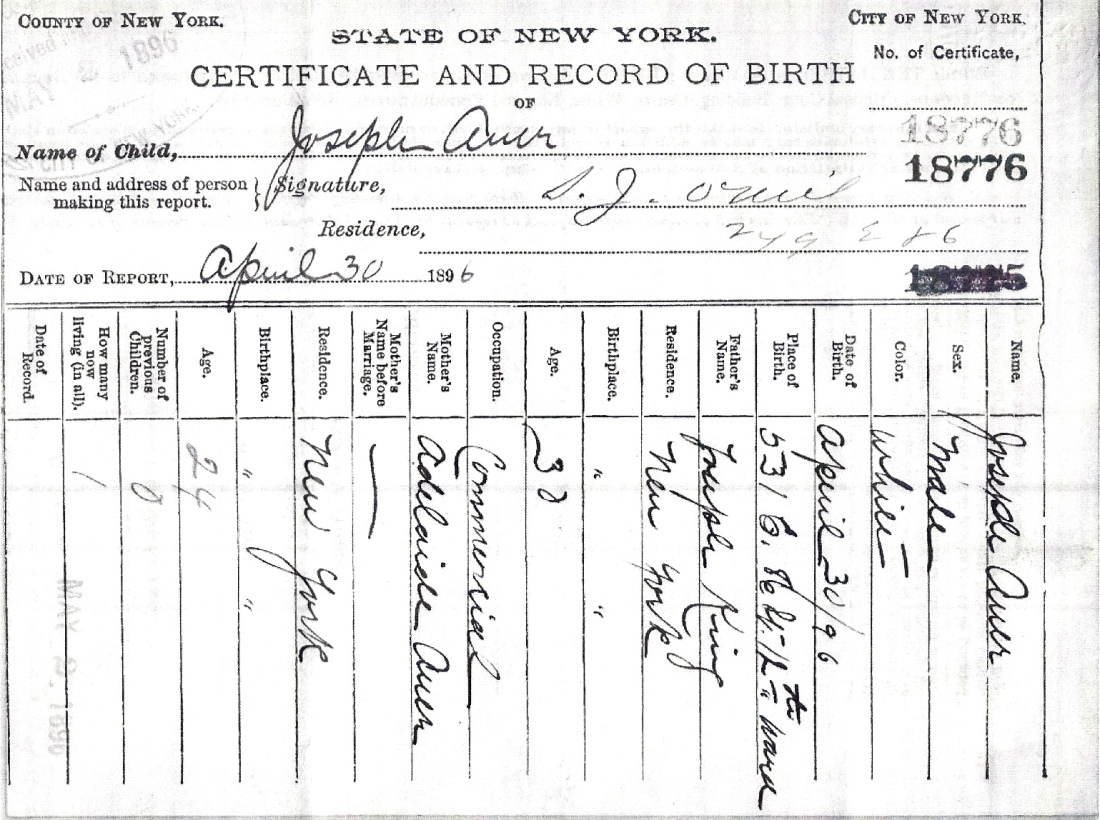
The birth certificate showed Joseph Auer was born to Adelaide Auer and Joseph King, at a Catholic hospital that served the poor and destitute. Records indicated Joseph was left at the Foundling Home within a few days of his birth.
I searched and searched for information about his parents, but there were no records. The names Joseph King and Adelaide Auer were pseudonyms. His parents wanted never to be found.
I continued searching for anything that could tell me more about Grandpa. I found his World War I draft registration. Under “Place of Birth,” it said “Unknown.” That one word, “Unknown,” hit me in the gut—it was so sad.
I became obsessed, knowing that DNA testing had the potential to connect me to his origins. I felt a pressure to hurry. I belong to the last generation that knew Grandpa. And, with each generation, the DNA trail fades like an old photograph.
I learned more about his life by scouring old newspapers. He was among the first young men from Central Missouri drafted during the first World War. I talked to my older brother, Jack, about this. Jack had a lot in common with Grandpa and they would work on projects together—carpentry, car repair, painting—and sometimes Grandpa would talk to Jack about his past.
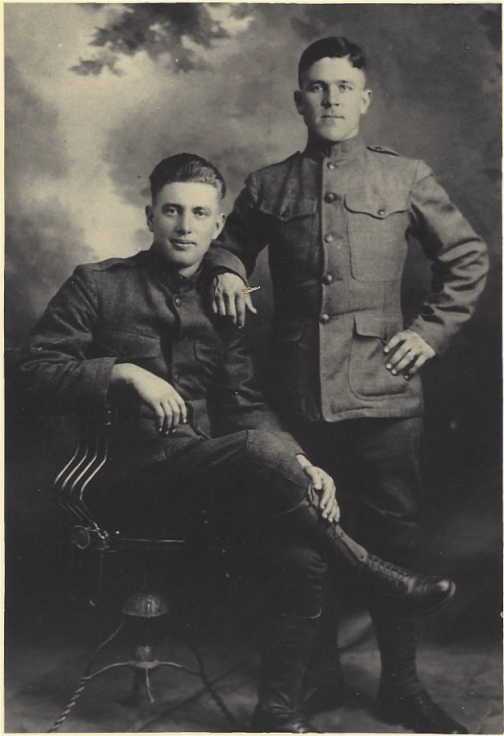
Grandpa briefly mentioned the war, hinting at traumatic experiences, but then shut down. He said just enough for Jack to know Grandpa had seen the human cost of war up close.
After the war, Grandpa married into a prominent family in Jefferson City and he started his own family. He also started his own business as an automobile dealer. He sold the cars, repaired them, and taught his customers to drive.
His business did well. In September 1929, he went on a tour of Hupmobile factories to see the new models. The next month, the stock market crashed, and his business slipped away.
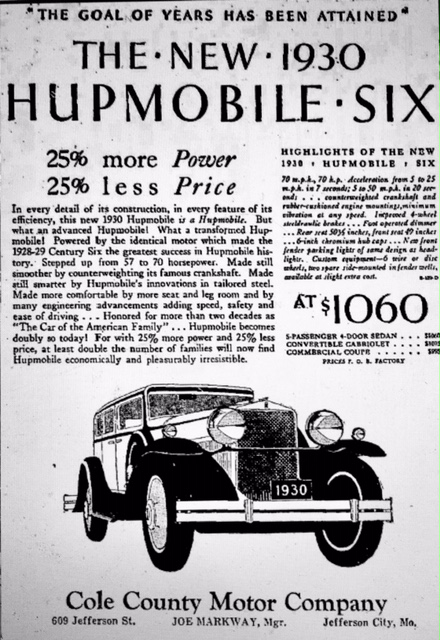
After several weeks, my AncestryDNA results came in.
A few months later, I found a promising lead, a few DNA matches that connected only through Grandpa. One of these matches had a family tree that included three siblings who all would have been in their 20s or early 30s when Grandpa was born. And…they all lived in New York.
Through a lot of work, I pieced together that George Van Sten, from Brooklyn, was Grandpa’s father. George lived a rather colorful life, and he made the newspapers as a result.
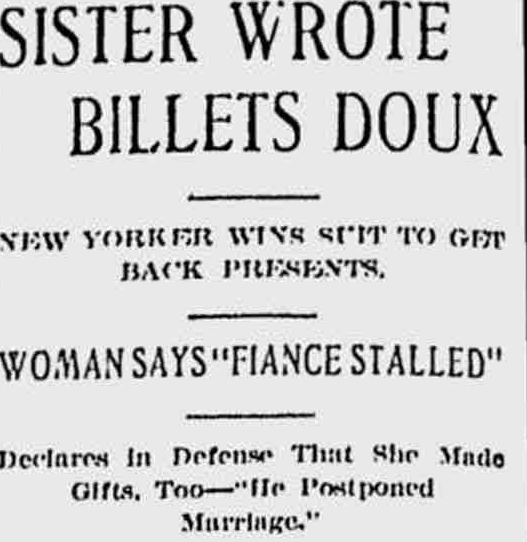
I had no leads for Grandpa’s mother. As I was talking about this with my brother one day, Jack told me: “He always said his mother was Abbie Doyle.” Later one of my cousins told me the same thing.
I was stunned. How could Grandpa know this?
Jack said Grandpa was clearly bothered by what he had learned in New York, and would start to talk and then stop. His feelings of abandonment were overwhelming, and they took away his voice, preventing him from telling all that he knew about his story. It seems he was a secret, and being a secret hurt.
I searched everywhere for signs of Abbie, or Abigail Doyle. I learned that searching for Irish names in New York in the late 1800s didn’t narrow things down much.
Then one day I was looking through a family tree on Ancestry.com. I saw a name—Abbie Camille Doyle–could this really be her?
Abbie was born in Northampton, Massachusetts in 1873. The timing would fit…
Abbie was the youngest of six children, with four brothers and one sister. Her father, Jeremiah Doyle, and her mother, Margaret Foley, head each come to America from Ireland during the potato famine. Her parents married in Holyoke, Massachusetts, in 1856.
When the Civil War began, Abbie’s father joined the Union Army, and he was wounded soon thereafter. He was discharged due to “disability. This was 12 years before Abbie’s birth. What happened after that? Did her older siblings work to support the family? Her father died when she was just eight years old.

In Massachusetts records from 1899, I found Abbie married William Dolan. The marriage record listed William as residing in New York City. Additional DNA research provided overwhelming evidence that Abbie was Grandpa’s mother.

I tried to imagine what things had been like for her. I don’t know the circumstances, but she had found herself expecting a child. She gave birth as a poor single mother. Her life could not have been easy and her emotions must have been complex. She must have felt alone, with no good alternatives.
I found myself caring about this woman I had never met.
And then, I received a message from a descendant of one of Abbie’s siblings. My newfound cousin had sent me a family photo that included Abbie and three of her brothers. As I gazed into her eyes for the first time, I saw my grandfather, and I realized he had found Abbie. And so had I.
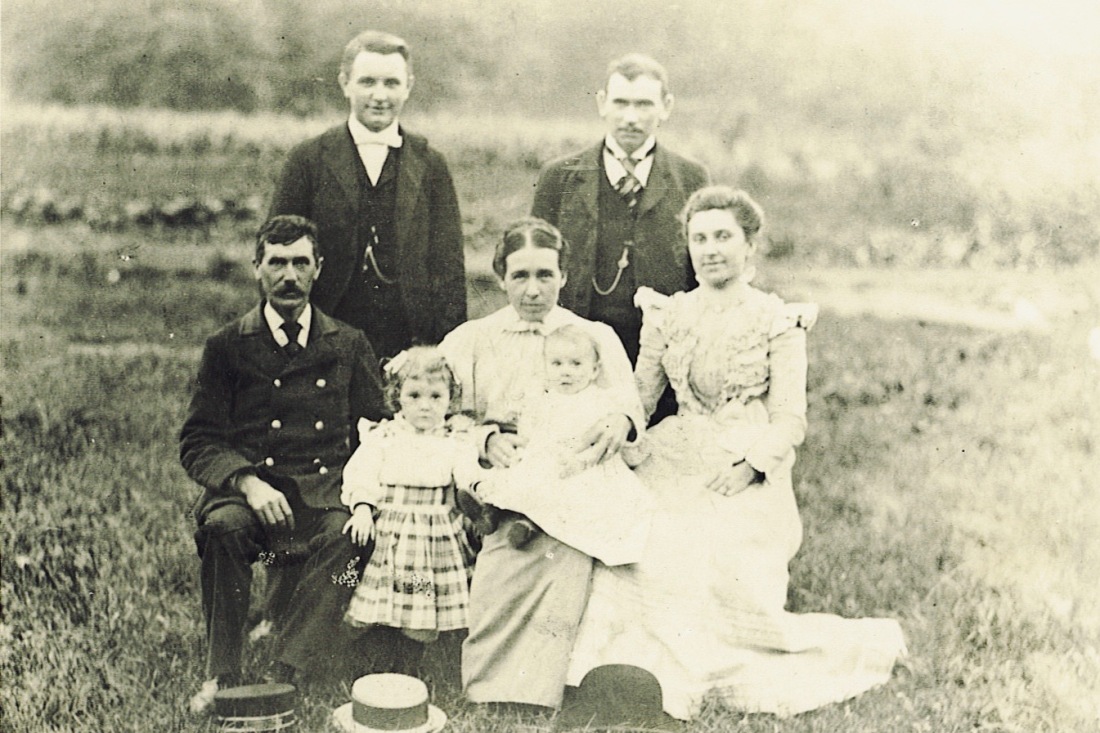
My grandfather was Henry Markway, who is the believe is the second person from the right in the second row of the picture of the Fred Markway family. I recall being introduced to Fred Markway as one of his great grandchildren when I was a young child. I have a copy of the picture shown in this blog.
LikeLike
I love your story, I have read a book about the Orphan Train. Sad.
LikeLike
Thank you.
LikeLike
Great story about your Gramps,
Greg! I think the public and fans of immigrant history will really like it!!
Max
LikeLike
The baby is my Grandmother, Elizabeth Doyle Driscoll
BTW … I have a better photo of this same shot.
LikeLike
Oh wow, it’s nice to know that! Do you know who the man in the back on the left is? If you have a better photo that you’d be willing to share, I’d be very appreciative.
LikeLike
I met someone at the New York Foundling reunion last June who told this wonderful story.
LikeLike
Thank you so much for remembering. That was me. Since the reunion, I have confirmed my grandfather’s mother and communicated with biological family.
LikeLike
Very interesting history. Thank you. In 1881, a 16-year-old Cornelius Doyle from Northampton died in an industrial accident. Evidently not the brother in that photo, as Abbie would have been 8. I can find the notice if it interests you.
LikeLike
I wonder if this might have been her cousin–right location, and many named Cornelius in her family. Are you related? Yes, I’d like to see that article…
LikeLike
Hi again. No relation. I just happened to be reading through the New York Times, March 17, 1881 (long story). Second page, far right column, headed “Whirled around a Shaft.” As that title suggests, it’s not pleasant. So many horrible factory accidents back then. I began Googling out of curiosity, wondering if the poor boy had family to grieve. That lead me to your blog. All the best.
https://timesmachine.nytimes.com/timesmachine/1881/03/17/issue.html
LikeLike
I have no doubt that this Cornelius was family to me (likely was a cousin to my great grandmother). Your trip around the internet sounds like how MY mind works.Thank you for responding.
LikeLike
I have been looking and it appears this Cornelius was the son of a John and Mary McCarthy Doyle. Very likely a close relative of the Doyles I have written about. They were from the same parish in Ireland–Killorglin.
LikeLike
Killorglin in Co Kerry
Is where I emigrated from . I hope you go to visit
A beautiful place .
A wonderful story glad you found your family of origin.
Margaret Hourihan
LikeLiked by 1 person
Wonderful story Greg 🙂
I am on a similar journey to understand my grandmother and her birth parents stories. A cousin told me she tried up into her 70’s and 80’s to find out who her birth parents were but never did. She lived to be 94 and passed away in 1990. I only met her a handful of times but it means alot to me to finish this for her.
Take care,
Gal
LikeLike
There is something that pulls us to do this work, and we can’t fully put it into words.
LikeLike